Parenting with Purpose: Building Strong, Confident Children | Effective Parenting Guide

In the ever-changing landscape of modern parenting, one question stands paramount: How can we raise children who are not just academically successful, but emotionally resilient and confident?
Introduction: The Journey of Purposeful Parenting
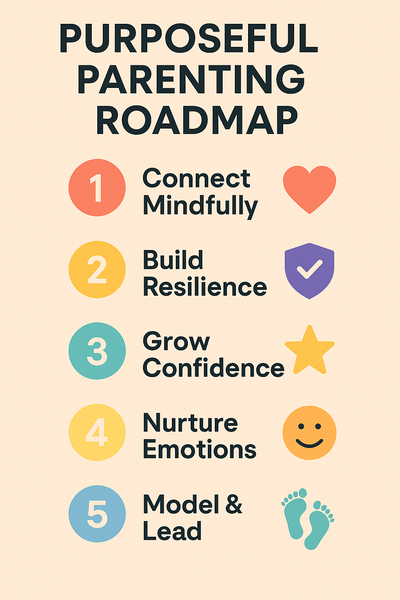
Parenting is one of life's most profound journeys, filled with immense joy, challenges, and opportunities for growth—for both children and parents. Moving beyond simply reacting to the day-to-day demands of raising children, "Parenting with Purpose" or "Intentional Parenting" invites a more conscious, thoughtful approach. Explore more on Parenting with Purpose.
- Defining "Parenting with Purpose" and "Intentional Parenting":
- Purposeful parenting involves actively engaging with children, keeping long-term goals in mind for how they can develop into the best versions of themselves. This approach emphasizes connecting, listening, discussing, and nurturing. It is fundamentally about teaching children respect, an understanding of right conduct, and the ability to form meaningful connections with others.
- Intentional parenting requires parents to carefully consider the choices they make in raising their children. It means tailoring parenting strategies to suit each child's unique needs and temperament, actively working to understand and meet those needs to guide their development and overall well-being. This style of parenting often prioritizes deep connection, clear boundaries, a stable family structure, and consistency in responses.
- The significance of these approaches lies in their proactive nature. Instead of parenting on autopilot or merely reacting to a child's behaviors, purposeful parenting is a conscious, goal-oriented method aimed at fostering a child's growth, happiness, and overall positive development. It is about breaking cycles of reactive parenting and cultivating a calmer, more connected family life. The consistent thread through these definitions is the emphasis on "connection"; a strong, secure parent-child bond is not merely a pleasant outcome but a central mechanism through which purposeful parenting achieves its aims. Learn about building strong bonds.
- The Goal: Strong and Confident Children:
- The ultimate aim of the purposeful parenting strategies discussed in this guide is to help cultivate children who are not only strong—meaning resilient in the face of life's inevitable adversities—but also confident in their abilities, their worth, and their place in the world. These two qualities, strength and confidence, are deeply intertwined and form the bedrock of a well-adjusted, capable individual.
- A Roadmap for This Guide:
- This guide will explore several key areas essential for parenting with purpose. It will delve into the principles of mindful parenting as a foundation for connection, offer strategies for building resilience and nurturing confidence, discuss the importance of fostering emotional intelligence, and outline core effective parenting techniques. These include effective communication, setting healthy boundaries, encouraging independence, providing unconditional love, and understanding the power of parental modeling. For more(parenting tips ), visit our blog.
The Mindful Parent: The Foundation of Purposeful Connection
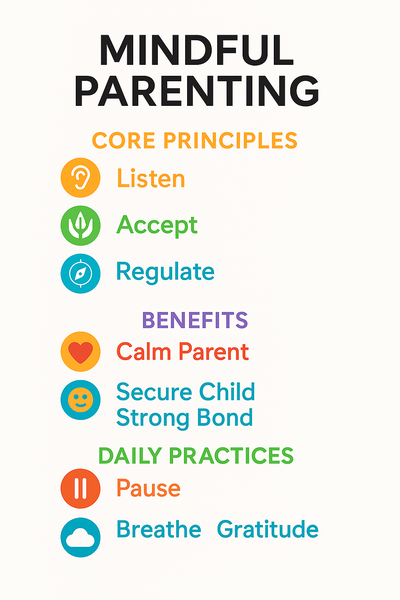
At the heart of purposeful parenting lies the practice of mindfulness—bringing a particular quality of attention to the present moment. Mindful parenting is not about adding another complex task to an already busy schedule; rather, it's about transforming the way parents relate to themselves, their children, and their parenting experiences. Discover mindful parenting techniques.
- What is Mindful Parenting? Core Principles:
- Mindful parenting is the practice of bringing intentional, nonjudgmental awareness to interactions with one's child. It involves staying open, present, and compassionate, even during challenging moments. It means parenting consciously, in the present moment, and without immediate judgment.
- Several core elements define this approach :
- Listening with full attention: Paying close attention to the child and the current parenting experience.
- Nonjudgmental acceptance of self and child: Observing and accepting one's own and the child's thoughts, feelings, and behaviors without criticism. This includes accepting their emotions as they are, without labeling them "good" or "bad."
- Emotional awareness of self and child: Recognizing and understanding the emotions present in oneself and in the child.
- Self-regulation in the parenting relationship: Managing one's own emotional and behavioral responses in a balanced way, especially during stressful interactions.
- Compassion for self and child: Approaching oneself and the child with kindness, understanding, and a desire to alleviate distress.
- The essence of mindful parenting is not about achieving perfection. Instead, it's about embracing the inherent imperfections of family life and choosing to respond with intention rather than reacting on autopilot. This practice helps parents become more emotionally present, calm, authentic, and open to learning from parenting challenges.
- Benefits of Mindful Parenting for You and Your Child: The practice of mindful parenting offers a wealth of benefits that extend to parents, children, and the parent-child relationship itself.
- For Parents:
- A significant benefit is the reduction of parental stress. Chronic stress can negatively impact parenting skills, leading to more rejecting, controlling, and reactive behaviors, and less warmth. Mindfulness training directly intervenes in this stress cycle. It helps parents avoid the primitive "fight, flight, or freeze" response that can be triggered in stressful parenting situations (e.g., a child's tantrum) but is unhelpful and potentially damaging when there is no real danger.
- It improves the ability to remain calm and present, even amidst chaos.
- It enhances self-compassion and reduces tendencies towards harsh self-criticism, which many parents experience.
- For Children:
- Mindful parenting supports healthy emotional development and fosters better emotional regulation skills in children. Explore transforming toddler tantrums.
- It has been linked to improved social decision-making skills in children.
- Children raised by mindful parents tend to be more secure, patient, and capable of cooperation and sharing—qualities that are invaluable for success in life.
- For the Parent-Child Relationship:
- It strengthens the parent-child bond and cultivates a more positive and nurturing relationship.
- It can lead to reduced overall family stress and make the parenting journey less stressful over time.
- It improves communication, allowing families to navigate challenges and disagreements more cooperatively and constructively. The pathway appears to be that by reducing their own stress and increasing their emotional regulation, parents can engage in more responsive and less reactive parenting behaviors. These improved behaviors, in turn, create a more supportive environment for children, leading to better emotional and social outcomes for them. The various components of mindful parenting—such as nonjudgmental acceptance making it easier to be emotionally aware, which then supports self-regulation—work together in a synergistic way to create these positive shifts.
- For Parents:
- Simple Ways to Practice Mindful Parenting Daily: Integrating mindful parenting into daily life doesn't require lengthy sessions; it's about bringing mindful awareness to everyday interactions. Many of these practices begin with the parent's own internal state, emphasizing that effective mindful parenting often starts with the parent's personal mindfulness journey.
- Pause Before Responding: When faced with a challenging behavior or a stressful situation with a child, the simple act of taking a pause—even for just two seconds—before reacting can make a profound difference. This brief moment interrupts automatic, reactive patterns and creates space for a more intentional, thoughtful response. This pause can be the key to de-escalating a conflict rather than fueling it.
- Listen with Full Attention: When a child is speaking, strive to give them undivided attention. This means putting away distractions like phones, making eye contact, and listening with the genuine intention to understand their words, the emotions behind them, and their perspective. This practice makes children feel truly heard and valued, which is fundamental for a strong connection.
- Notice Your Own Feelings & Triggers: Cultivate an awareness of one's own emotional state—stress, frustration, tiredness—without judgment. It is also helpful to identify specific behaviors or situations that tend to trigger strong emotional reactions. Recognizing these triggers is the first step toward consciously choosing a different response. This self-awareness is crucial for self-regulation.
- Practice Nonjudgmental Acceptance: Strive to accept the child and their emotions as they are in the moment, without labeling them as "good" or "bad," "right" or "wrong". This involves meeting each moment as it is, rather than as one wishes it would be. Such acceptance creates a safe and open space for genuine emotional expression.
- Cultivate Compassion (for self and child): When faced with challenging behavior, try to look beneath the surface for the underlying need or feeling the child might be expressing. Practice forgiveness for mistakes—both the child's and one's own—as these are opportunities for learning and reconnection. It is also important to acknowledge one's own efforts and challenges in the parenting role with self-compassion. Compassion infuses boundaries with humanity.
- Incorporate Brief Mindfulness Practices:
- One-Minute Reset: Dedicate just one minute to focus entirely on the child, putting aside all other tasks and thoughts.
- Deep Breathing: Utilize a simple deep breathing technique (e.g., inhale for a count of four, hold for four, and exhale for six) to calm the nervous system before reacting to a stressful event.
- Five Senses Reset: When feeling overwhelmed, ground oneself in the present moment by naming five things one can see, four things one can touch, three things one can hear, two things one can smell, and one thing one can taste.
- Daily Mindfulness Practice: Consider dedicating about ten minutes each day to a formal mindfulness practice, such as meditation, spending quiet time in nature, or mindfully listening to music. This regular practice helps build overall mindfulness capacity and can serve as "preventive maintenance" for emotional equilibrium. Find family mindfulness activities.
- Stay Present and Flexible: Make an effort to show up fully for interactions with the child, whether during significant moments or simple, everyday activities. Life with children often involves changes to plans and routines; cultivating flexibility allows for thoughtful responses rather than rigid reactions.
- Practice Gratitude: Intentionally notice and appreciate the good moments—the laughter, connection, and growth—however small they may seem. This nurtures a mindset of joy and abundance. Learn about cherishing life's little moments.
Mindful parenting, therefore, is less about employing a set of techniques "on" a child and more about a transformative practice for the parent. This internal shift in the parent then naturally and positively transforms the parent-child dynamic.
Building Unshakeable Strength: Nurturing Resilience in Your Child
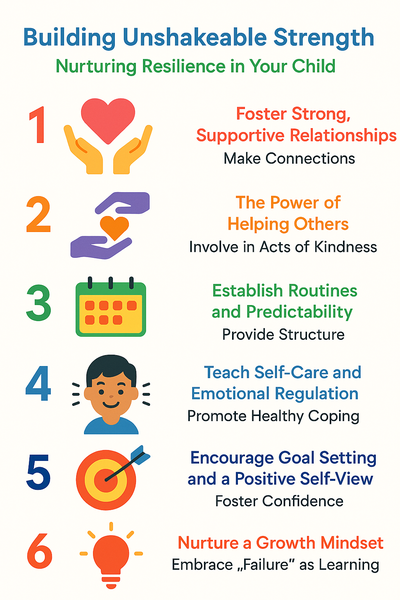
Resilience is the capacity to navigate life's inevitable challenges, to bounce back from adversity, and to continue to grow and thrive despite setbacks. It is a cornerstone of mental and emotional strength, equipping children with the tools they need to face difficulties with courage and adaptability.
- Understanding Resilience and Its Importance:
- Resilience is defined as the ability to adapt well in the face of adversity, trauma, tragedy, threats, or even significant sources of stress. It's about overcoming serious hardship and not being derailed by it. A key aspect of resilience is helping children understand that uncomfortable emotions like sadness, anxiety, or disappointment are part of life but usually don't last forever; they can experience these feelings and know they will be okay.
- Nurturing resilience is crucial because it is essential for lifelong health and well-being. When children learn to cope with manageable threats—what is sometimes called "positive stress"—they develop critical coping skills. Research indicates that resilience can improve optimism, reduce the likelihood or severity of anxiety and depression, and contribute to academic strengths and success. Indeed, resilience can act as a protective factor, a kind of "vaccine," against the potentially toxic effects of stress and Adverse Childhood Experiences (ACEs).
- Actionable Strategies to Build Resilience: Resilience is not an innate, fixed trait but rather a dynamic process involving a set of capabilities that can be actively taught, nurtured, and strengthened at any age. Parents play a vital role in fostering these skills.
- Foster Strong, Supportive Relationships (Make Connections):
- Explanation: The foundation of resilience is often found in secure, stable, and nurturing relationships with caring adults, primarily parents. These relationships teach children trust, how to form friendships, and how to manage their emotions effectively. Connecting with others provides crucial social support, which is a key component of resilience.
- Action: Actively teach children skills like empathy and good listening. Encourage positive connections with peers and work on building a strong, supportive family network. Make time for regular family activities and dedicated one-on-one play with each child.
- The Power of Helping Others:
- Explanation: Engaging in acts of kindness and helping others can be incredibly empowering for children, especially if they are feeling helpless or overwhelmed by their own challenges. Contributing to the well-being of others can enhance a child's sense of meaning, purpose, and self-efficacy, all of which bolster resilience.
- Action: Involve children in age-appropriate volunteer activities, or simply ask for their help with tasks around the home that they can successfully manage.
- Establish Routines and Predictability:
- Explanation: Consistent daily routines can be very comforting for children, particularly younger ones, as they provide a sense of structure and predictability in their world. Knowing what to expect helps children feel secure and more capable of taking on responsibilities.
- Action: Work with children to develop and maintain regular routines for meals, homework, chores, and bedtime.
- Teach Self-Care and Emotional Regulation:
- Explanation: Understanding the importance of basic self-care—such as adequate nutrition, regular physical activity, and sufficient sleep—helps children maintain balance and better cope with stress. Learning to recognize, understand, and manage their emotions effectively prevents them from becoming overwhelmed by strong feelings.
- Action: Educate children about the importance of self-care and ensure they have time for enjoyable, relaxing activities. Practice "emotion coaching" by acknowledging, naming, and validating their emotions. Share and teach coping techniques like deep breathing exercises, progressive muscle relaxation, or positive self-talk.
- Encourage Goal Setting and a Positive Self-View:
- Explanation: Helping children learn to set reasonable, achievable goals and work towards them step by step can enhance their focus and build resilience in the face of challenges. A positive self-view, which includes trusting oneself to solve problems and make appropriate decisions, is also integral to resilience. Successfully navigating challenges inherently builds a child's belief in their capabilities, which in turn promotes self-esteem; research shows that resilience positively correlates with and predicts higher self-esteem.
- Action: Teach children how to set realistic goals and break larger goals into smaller, manageable steps. Help them recall past instances where they successfully handled hardships, reinforcing their ability to overcome difficulties. Encourage the use of positive affirmations, such as "I am capable" or "I can handle this".
- Nurture a Growth Mindset (Embrace "Failure" as Learning):
- Explanation: Cultivating a growth mindset—the belief that abilities and intelligence can be developed through dedication and hard work—helps children view challenges and even failures not as insurmountable obstacles but as valuable opportunities for learning and improvement. When parents model this perspective, children are more likely to adopt it themselves.
- Action: Help children reframe setbacks, mistakes, or "failures" as learning experiences rather than as reflections of their inherent worth or ability. Emphasize the importance of effort, persistence, and the learning process itself, rather than focusing solely on innate talent or perfect outcomes.
- Take a Break and Maintain Perspective:
- Explanation: It is important to validate all feelings, including anxiety or distress. However, it is also helpful to teach children to focus on aspects of a situation they can control or act upon. Maintaining a hopeful, long-term outlook can help children navigate painful events without losing sight of the bigger picture.
- Action: Help children challenge unrealistic or overly negative thoughts. Be mindful of their exposure to troubling news or conversations. Help them understand that difficult times are often temporary and that there is a future beyond current struggles.
- Foster Strong, Supportive Relationships (Make Connections):
Building resilience is not about shielding children from all difficulties, but about equipping them with the internal and external resources to navigate those difficulties effectively. It is a fundamental aspect of preventative mental health care, providing children with coping capacities that will serve them throughout their lives.
Cultivating Inner Belief: Raising Confident Children
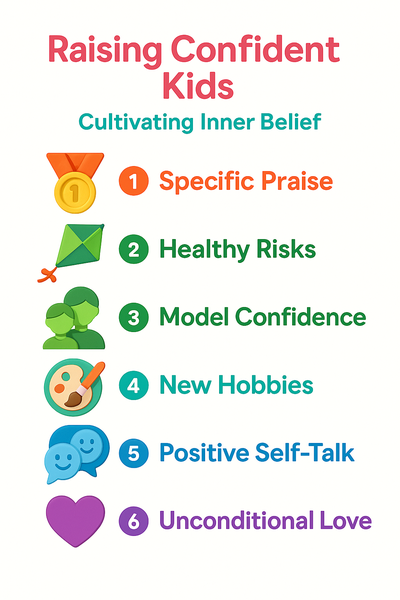
Confidence, often intertwined with self-esteem, is the belief in one's own abilities, qualities, and judgment. It is a vital ingredient for a child's healthy development, influencing their willingness to explore the world, engage with others, and pursue their goals. Raising confident children involves nurturing an inner sense of worth and capability that is resilient to life's ups and downs.
- The Link Between Self-Esteem, Confidence, and Future Success:
- Self-esteem refers to how much a person values, approves of, appreciates, prizes, or likes themself. Children with healthy self-esteem generally feel liked, accepted, and confident in who they are. Confidence allows children to approach new experiences with a positive attitude, build constructive relationships, and ultimately grow into happier and more successful adults.
- There's a strong connection between emotional intelligence (which includes self-awareness and self-management) and self-confidence; children who understand and manage their emotions well tend to feel more assured.
- Confidence significantly impacts a child's willingness to learn new things, interact socially, take positive and healthy risks, and even how they respond to failure.
- The importance of this inner belief cannot be overstated. Children who feel good about themselves are more likely to try their best, persist through challenges, and cope effectively with mistakes. This positive self-regard generally helps them perform better at school, at home, and in their friendships. Conversely, low self-esteem can lead to self-doubt, social withdrawal, an unwillingness to try new things, difficulty standing up for oneself, and a tendency to give up easily when faced with setbacks.
- Practical Ways to Nurture Confidence: Nurturing confidence is less about shielding children from all disappointment and more about creating an environment of unconditional love, providing opportunities for mastery (and learning from experiences of non-mastery), and modeling healthy self-regard.
- The Art of Effective Praise and Focusing on Effort:
- Explanation: The way praise is delivered matters immensely. Praise is most effective in building confidence when it is specific and focuses on the child's effort, the process they engaged in, and their specific achievements, rather than on innate ability (e.g., "you're so smart") or general, vague compliments. This approach helps children understand what they are doing well and motivates them to continue applying effort.
- Action: Instead of saying, "You're such a good artist," try, "I noticed how carefully you chose your colors and how patiently you worked on filling in the details in your drawing. The way you blended those shades is really creative!". Consistently praise effort, persistence, and individual improvement rather than just the final outcome.
- Allowing Children to Take Healthy Risks and Learn from Mistakes:
- Explanation: A crucial, though sometimes counterintuitive, aspect of building confidence is allowing children to make mistakes and learn from them. This process is a natural part of life and helps build perseverance and problem-solving skills. Overparenting, or stepping in too quickly to prevent any failure, can inadvertently hinder the development of a child's sense of capability and confidence. Mistakes should be viewed as valuable learning opportunities, not as definitive failures. When children are not allowed to make mistakes, they may internalize the idea that they are not capable.
- Action: Resist the urge to immediately rescue a child from every struggle or disappointment. Allow them opportunities to solve problems independently and to take age-appropriate risks. When mistakes happen, help them reframe the experience as a chance to learn and grow, rather than as a negative reflection on their abilities.
- Modeling Confidence as a Parent:
- Explanation: Children are keen observers and learn a great deal by watching their parents' behaviors, attitudes, and responses. When parents model a positive attitude, self-respect, and confidence in their own abilities to handle challenges, they provide a powerful example for their children. This parental self-confidence can be contagious.
- Action: Be mindful of one's own self-talk and how challenges are approached in front of children. Demonstrate self-love, a healthy self-image, and constructive coping strategies. Show children through actions how one feels about oneself and how one treats others with respect.
- Encouraging New Hobbies and Problem-Solving:
- Explanation: Engaging in new hobbies or activities provides children with opportunities to set goals, work towards them, and experience both success and failure in a supportive context—all of which are essential for building healthy confidence. The process of solving problems encountered along the way builds confident judgment and a sense of independence.
- Action: Support children in exploring new interests, sports, or artistic pursuits. When they encounter difficulties, encourage them to brainstorm solutions and try different approaches, rather than providing the answers for them. Consider eco-friendly crafts or summer activities.
- Teaching Self-Care and Positive Self-Talk:
- Explanation: Helping children learn to be their own "biggest cheerleader" fosters internal confidence that is not solely dependent on external feedback or validation. Positive self-talk can counteract negative thought patterns that undermine self-esteem.
- Action: Work with children to develop positive self-affirmations or mantras they can use, such as "I can try my best," "It's okay to make mistakes," or "I am learning and growing".
- Providing Unconditional Love and Acceptance:
- Explanation: A deep-seated feeling of being loved and accepted unconditionally by parents is foundational to a child's self-esteem and confidence. This provides a secure base from which children can explore the world and take on challenges. True, lasting self-esteem often stems from this internal conviction of being loved and lovable, rather than solely from external achievements.
- Action: Ensure children know that parental love is not contingent upon their achievements, good behavior, or successes. Express love and acceptance consistently.
- Breaking Down Tasks and Setting Achievable Goals:
- Explanation: Confidence often improves incrementally by building on small successes. Helping children set and achieve realistic, manageable goals gives them a sense of purpose, direction, and accomplishment.
- Action: Assist children in breaking down larger tasks or goals into smaller, more achievable steps. Acknowledge and celebrate their effort and progress along the way, not just the perfect completion of the entire task.
- The Art of Effective Praise and Focusing on Effort:
Ultimately, nurturing confidence is about fostering an internal locus of control and a stable sense of self-worth, empowering children to believe in themselves even when faced with the inevitable imperfections of life.
The Heart of Connection: Core Pillars of Effective Parenting
Building strong, confident children through purposeful parenting rests on several key pillars that foster deep connection, understanding, and growth. These include nurturing emotional intelligence, communicating effectively, providing unconditional love, setting clear boundaries, encouraging independence, and the powerful influence of parental modeling.

A. Fostering Emotional Intelligence
Emotional Intelligence (EQ) is a critical life skill that significantly influences a child's development, relationships, and overall well-being.
- Understanding Emotional Intelligence (EQ): EQ encompasses the ability to monitor one's own and others' emotions, to discriminate between different emotions and label them appropriately, and to use emotional information to guide thinking and behavior. It profoundly impacts attention, memory, learning, the ability to build relationships, and even physical and mental health. Learn about psychological ways to raise a child.
- Recognizing, Understanding, and Labeling Emotions:
- Action: Parents can help children develop these skills by teaching them to identify physical cues associated with different emotions in themselves and in others (e.g., a frown for frustration, slumped shoulders for sadness). Using tools like a "mood meter" or feeling charts can help expand a child's emotional vocabulary beyond simple terms like "happy," "sad," or "mad," to more nuanced words like "curious," "anxious," or "content". It is also vital to discuss the potential causes and consequences of various emotions (e.g., "What happened that made the character in the story feel disappointed?"). For instance, a parent might observe, "I see you are frowning and your arms are crossed. Sometimes I do that when I feel frustrated. How are you feeling right now?".
- Why it matters: Accurately labeling feelings is the first step towards understanding and managing them. It helps children acknowledge the role emotions play in their lives and allows for more effective communication and regulation strategies. A key aspect of this process is conveying that all feelings are valid, even unpleasant ones; the focus is on learning to respond to them in constructive ways.
- Teaching Healthy Emotional Expression and Regulation:
- Action: Parents can model appropriate ways to express different feelings in different situations. It is important to teach children short-term coping strategies for managing intense emotions, such as taking deep breaths, engaging in positive self-talk ("I can handle this"), taking a short break from a frustrating situation, or seeking comfort from a trusted adult. It's also crucial to validate a child's emotions even if their resulting behavior is unacceptable (e.g., "It's understandable that you feel very angry right now, but it's not okay to hit your brother.").
- Why it matters: Developing strong EQ enables children to manage their emotions effectively, preventing them from being derailed by intense feelings like anger or anxiety. Research shows that children with higher emotional intelligence tend to pay attention better, are more engaged in school, have more positive relationships with peers, and are more empathic. These are not fixed traits but skills that can be taught and developed over time , equipping children for academic success, positive social interactions, and long-term mental health.
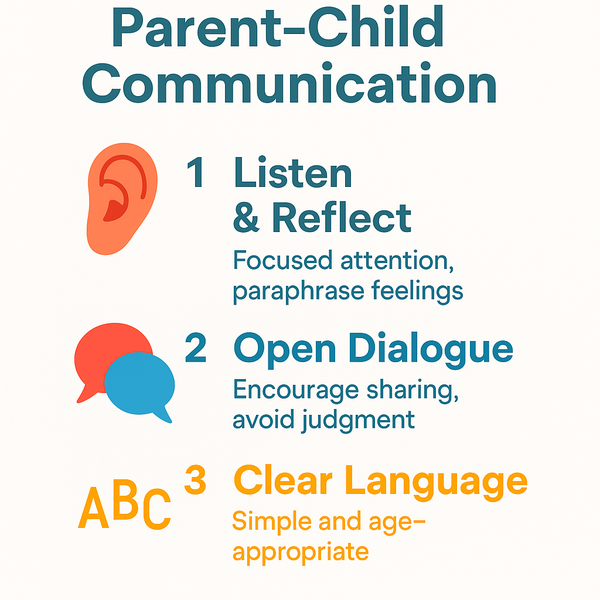
B. Communicating Effectively
Effective communication is the lifeblood of any healthy relationship, and this is especially true for the parent-child dynamic. It is a primary tool for building connection, understanding, and shaping a child's core identity.
- Active and Reflective Listening:
- Action: When a child is communicating, parents should strive to give their full, undivided attention. This involves putting aside distractions, making consistent eye contact (perhaps by getting down to the child's physical level), and using encouraging nonverbal cues like nods and smiles. Reflective listening involves paraphrasing or repeating back what the child has said in different words to ensure understanding and to show that one is genuinely paying attention (e.g., "So, it sounds like you're feeling frustrated because Marco didn't want to share his toy with you today?").
- Why it matters: These listening practices help children feel truly heard, understood, valued, and respected. This, in turn, strengthens the parent-child bond and can significantly boost a child's self-esteem.
- Creating Open Dialogue and a Safe Space for Sharing:
- Action: Parents should actively encourage their children to express their thoughts and feelings openly, without fear of judgment, ridicule, or immediate dismissal. Asking open-ended questions (e.g., "What was the most interesting part of your day?" rather than "Did you have a good day?") invites more detailed responses and fosters deeper conversations. It is also important for parents to make themselves consistently available to talk when their child needs them. Explore meaningful conversations with your teen.
- Why it matters: This approach builds trust and mutual understanding within the family. Children who feel genuinely loved, accepted, and safe are far more likely to open up and share their inner world—their joys, fears, concerns, and dreams—with their parents.
- Clarity and Age-Appropriateness:
- Action: It is essential to use language that the child can readily understand, taking into account their age and developmental stage. Communication should be clear, specific, and avoid the use of derogatory or shaming words.
- Why it matters: Clear and respectful communication ensures that the child feels respected and loved, and that they accurately understand parental expectations and messages. Children learn their primary communication patterns by observing their parents. When parents model open, respectful, and effective communication, they are directly teaching their children these invaluable life skills. Furthermore, the way parents communicate with their children profoundly influences the child's developing sense of self-worth and importance.
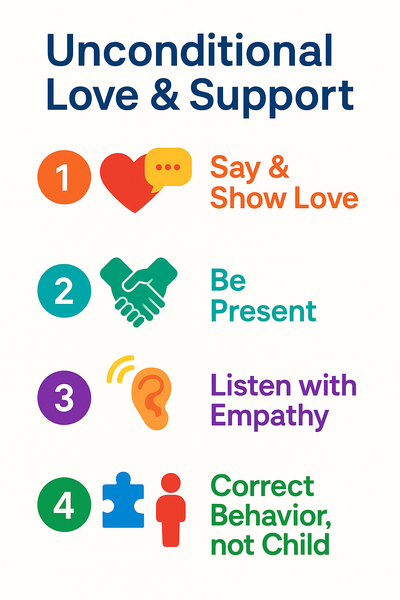
C. Providing Unconditional Love and Support
Unconditional love is the unwavering acceptance and affection for a child, regardless of their behaviors, achievements, or mistakes. It forms the secure emotional foundation upon which a child builds their sense of self and their capacity for healthy relationships.
- Its Importance for Security and Self-Worth:
- Unconditional love means offering consistent devotion and affection that is not contingent on a child's performance or adherence to expectations. It is a cornerstone for building strong, healthy relationships and profoundly nurtures a child's intrinsic sense of security and self-worth.
- Feeling loved unconditionally helps children develop confidence to explore the world, take healthy risks, and build resilience in the face of setbacks. It is a vital component of healthy psychological development. Research even suggests that nurturing and affection, key components of unconditional love, are linked to healthier brain development, particularly in areas related to memory, learning, and stress response.
- Separating Behavior from Character:
- Action: When addressing misbehavior, it is crucial to criticize the specific behavior, not the child's character or inherent worth (e.g., "It's not okay to leave your wet towel on the floor, please hang it up," rather than "You are so messy and inconsiderate"). Even when expressing disappointment or setting a limit, parents should verbally reaffirm their love and acceptance of the child as a person.
- Why it matters: This distinction teaches children that their actions or mistakes do not define who they are. It allows them to feel safe enough to be vulnerable and to learn from their errors without fearing the loss of parental love or approval.
- Practical Ways to Show Unconditional Love:
- Regularly express love through both words (e.g., "I love you," "I'm so glad you're my child") and affirming physical actions (e.g., hugs, gentle touches, a comforting presence).
- Provide consistent support and understanding, especially during challenging times or when a child is struggling.
- Dedicate quality one-on-one time with each child, giving them undivided attention, which makes them feel special and important.
- Practice empathy by striving to understand and acknowledge their feelings from their perspective, without immediate judgment or attempts to "fix" everything. It is important to note that providing unconditional love is not the same as being permissive or avoiding discipline. Children need clear boundaries and guidance; in fact, an environment without rules or consequences can be perceived by a child as a lack of care or love. Unconditional love operates alongside, and supports, the setting of these necessary limits.
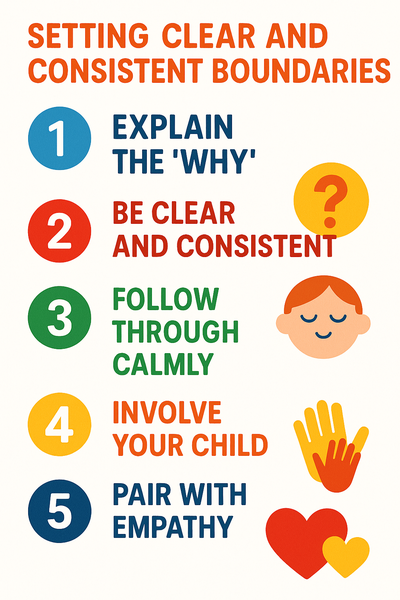
D. Setting Clear and Consistent Boundaries
Boundaries are the guidelines, rules, and limits that parents establish to help children understand what is expected of them, what is acceptable behavior, and how to navigate the world safely and respectfully. Far from being restrictive, clear and consistent boundaries provide a crucial sense of security and structure.
- Why Boundaries Create Security:
- Boundaries offer children structure and predictability, which helps them feel safe and secure. Children generally thrive when they know what to expect and have a clear understanding of how the world around them works.
- They are essential for healthy growth and development, acting as an "invisible scaffolding" that supports a child's journey toward becoming a capable adult. For young children whose prefrontal cortex (the part of the brain responsible for logic, impulse control, and understanding long-term consequences) is still developing, parental boundaries effectively serve as an "external prefrontal cortex," helping them make sense of situations their brains can't yet fully manage.
- Tips for Setting Effective Boundaries:
- Explain the "Why": Whenever possible and age-appropriate, help the child understand the reason behind a boundary. This promotes cooperation and helps them internalize the value of the limit. For example, instead of just saying "Quiet time now," one might explain, "From 3 to 4 PM is quiet time in our house. This is when Mommy needs to rest and recharge so I can be the best parent I can be for you later".
- Be Clear and Consistent: Boundaries are most effective when they are clearly communicated and consistently enforced. If a particular behavior is not acceptable today, it should generally not be acceptable tomorrow, even if the parent is tired or in a hurry. Use simple, direct, age-appropriate language when stating expectations and limits.
- Follow Through Calmly: If a consequence for crossing a boundary has been established and communicated, it is important to follow through calmly and without excessive anger or lecturing. This consistency helps the child understand that the parent means what they say and that boundaries are reliable.
- Involve Your Child (when appropriate): For older children, discussing rules and boundaries can sometimes promote a greater sense of cooperation and ownership, making them more likely to respect the limits.
- Model Respect for Boundaries: Parents should model respect for others' boundaries, including the child's personal space and feelings, where appropriate. This demonstrates the reciprocal nature of respect.
- Offer Choices Within Limits: Providing limited, acceptable choices can help children feel a sense of control and autonomy while still operating within the established boundaries. For instance, "It's time to clean up. Would you like to start with the blocks or the cars?"
- Pair with Empathy: Acknowledge the child's feelings about the limit, even while upholding it. For example, "I understand you're disappointed that TV time is over. It's hard to stop when you're having fun". Counterintuitively, clear boundaries can foster independence. By providing a safe and predictable framework, they allow children to make choices, learn time management, and develop problem-solving skills with more confidence. Setting boundaries is not about being punitive; it is an act of leadership and care that provides essential structure for a child's development, teaching self-regulation, respect, decision-making, and resilience. Explore positive discipline strategies.
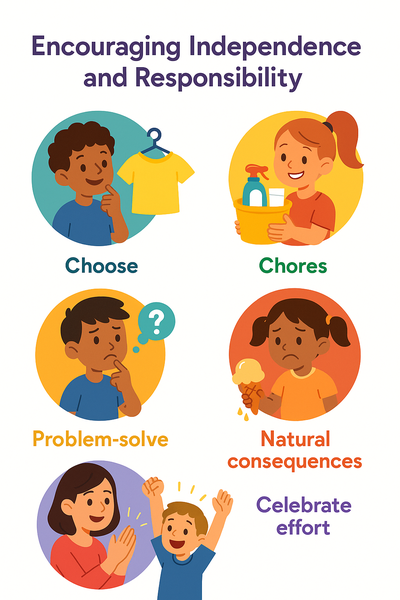
E. Encouraging Independence and Responsibility
Fostering independence and a sense of responsibility in children is a gradual process that equips them with essential life skills and contributes significantly to their confidence and competence.
- Age-Appropriate Ways to Foster Autonomy:
- Action: Parents can encourage independence by allowing children to make age-appropriate choices (e.g., what to wear from a selection of appropriate clothes, which game to play during free time), take on responsibilities suitable for their developmental stage (e.g., simple chores), and learn from the natural consequences of their decisions (within safe limits). It is also important to encourage children to attempt to solve problems themselves rather than parents stepping in immediately with a solution.
- Examples: Preschoolers can be encouraged to do parts of daily routines themselves, such as unzipping their coat or putting their toys away after playing. School-aged children can take on more complex chores like setting the table or helping with meal preparation.
- This is a gradual process that requires patience from parents, as allowing children to practice new skills often takes more time and effort than doing the task for them.
- The Long-Term Benefits of Self-Reliance:
- Encouraging independence from an early age fosters a child's self-confidence, resilience, problem-solving abilities, and overall mental health.
- It helps prepare them to become healthy, well-functioning, and capable adults who can navigate the complexities of life with greater assurance.
- Conversely, over-parenting, sometimes termed "helicopter parenting," while often stemming from good intentions, can inadvertently impede a child from gaining the necessary experience and confidence to become independent. Some experts even suggest a potential link between inadequate opportunities for developing independence and increased rates of anxiety in children. Encouraging independence is an investment in a child's future competence and well-being. It requires parents to consciously provide opportunities for children to learn and grow through their own efforts and experiences, stepping back when appropriate to allow for this development.
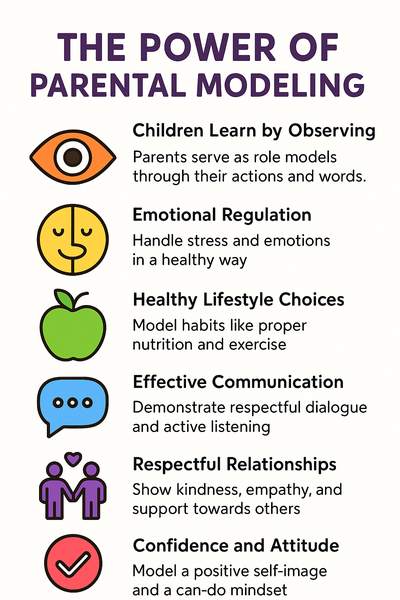
F. The Power of Parental Modeling
Parents are, without a doubt, a child's first and most influential teachers. Children learn a vast array of behaviors, attitudes, values, and coping mechanisms by observing the adults in their lives, particularly their parents.
- Children Learn by Observing: The principle "actions speak louder than words" is profoundly true in parenting. Children are constantly watching and absorbing how their parents interact with the world, with others, and with themselves. They often emulate what they see, more so than what they are told. As succinctly put, "Kids don't do what we say. They do what we do". Learn about leading by example.
- Modeling Key Areas: The influence of parental modeling is comprehensive, affecting many areas of a child's development:
- Emotional regulation: How parents manage their own stress, frustration, and other emotions when triggered provides a direct model for children.
- Healthy lifestyle choices: Children observe parental habits regarding nutrition, physical activity, and overall self-care.
- Effective communication and conflict resolution: The way parents communicate with each other, with their children, and with others, as well as how they handle disagreements, teaches children vital interpersonal skills.
- Respectful and supportive relationships: Children learn about empathy, kindness, and how to build and maintain healthy relationships by observing their parents' interactions.
- Decision-making and accountability: Parents model how to make thoughtful decisions and take responsibility for one's actions.
- Confidence and a positive attitude: A parent's own self-assurance and outlook on life can significantly influence a child's developing confidence and optimism.
- Why it matters: Positive parental modeling plays a crucial role in shaping a child's emotional intelligence, empathy, self-esteem, and social skills. The behaviors and values modeled by parents have long-lasting effects, directly influencing a child's development of essential life skills, their emotional resilience, and their ability to form healthy relationships as they move into adolescence and adulthood. Every action and reaction a parent displays is a potential lesson, underscoring the immense responsibility and opportunity parents have to consciously embody the qualities they wish to nurture in their children.
Looking Ahead: The Lasting Impact of Parenting with Purpose
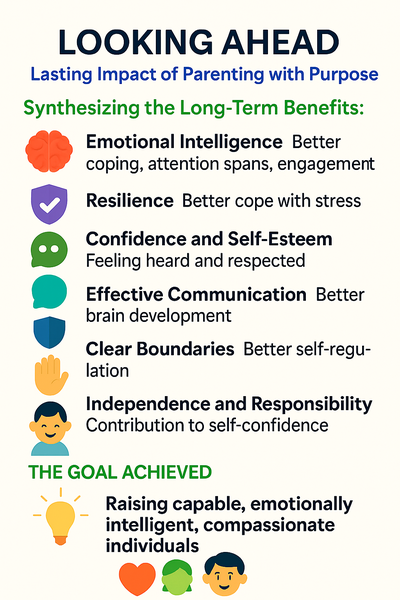
The journey of parenting with purpose, incorporating mindfulness, resilience-building, confidence-nurturing, and core effective parenting strategies, is an investment with profound and lasting returns. The benefits are not isolated to childhood but extend into adolescence and adulthood, shaping individuals who are well-equipped to navigate life's complexities.
- Synthesizing the Long-Term Benefits: The consistent application of purposeful parenting principles yields a cascade of positive outcomes that reinforce each other, contributing to the holistic development of a child:
- Emotional Intelligence: Children who develop strong EQ tend to exhibit better attention spans, greater engagement in school, more positive peer relationships, increased empathy, and better behavioral regulation, often leading to higher academic grades. As adults, higher EQ is linked to more satisfying relationships, greater job satisfaction, and, for those in helping professions like teaching, lower stress and burnout. Furthermore, EQ fosters creativity, strong character, self-confidence, enhanced communication skills, and an improved ability to manage life's challenges constructively.
- Resilience: Nurturing resilience contributes to lifelong health and well-being. Resilient individuals are better able to cope with stress, experience reduced rates of anxiety and depression, often display greater optimism, and achieve more academic success. Crucially, resilience can act as a protective "vaccine" against the long-term negative impacts of toxic stress resulting from Adverse Childhood Experiences (ACEs).
- Confidence and Self-Esteem: Children with healthy confidence and self-esteem are more willing to try new things, face challenges with a positive outlook, cope effectively with mistakes, and generally perform better in school, at home, and in social situations. This inner belief affects their willingness to learn, interact with others, and take healthy risks.
- Effective Communication: When children learn good communication skills within the family, they carry these skills into all areas of their lives. Feeling heard and respected through effective parental communication boosts their self-esteem and makes them more cooperative.
- Unconditional Love: Experiencing unconditional love from parents is linked to healthier brain development, an enhanced ability to form positive and secure relationships later in life, greater stress resilience, a stronger immune system, and more robust self-esteem.
- Clear Boundaries: Growing up with clear, consistent, and lovingly enforced boundaries helps children develop better self-regulation, respect for others, sound decision-making skills, resilience, an awareness of safety, effective time management, and greater emotional intelligence.
- Independence and Responsibility: Fostering independence and a sense of responsibility from an early age contributes to a child's self-confidence, resilience, problem-solving abilities, and overall mental health as they grow.
- Parental Modeling: The positive behaviors, attitudes, and values modeled by parents instill crucial life skills, emotional resilience, and the capacity to form healthy adult relationships. This contributes to a future generation that is more emotionally intelligent, responsible, and resilient.
- The Goal Achieved: Collectively, these purposeful parenting practices contribute to raising children who are not just strong in the face of adversity and confident in their abilities, but also emotionally intelligent, well-adjusted, capable, compassionate, and kind individuals. They are better prepared to meet the challenges and embrace the opportunities that life presents. The impact of these early experiences and learned skills creates a positive trajectory that extends far beyond the childhood years, influencing an individual's adult life in terms of their relationships, career choices, mental and physical health, and overall well-being. Parenting with purpose is thus an investment with profound and enduring returns, not only for the child and the family but for society as a whole.
Your Purposeful Parenting Toolkit: Key Takeaways
Parenting with purpose is an ongoing journey of learning, connection, and growth. It is not about achieving perfection but about making conscious, intentional efforts to nurture strong, confident, and well-adjusted children. The strategies outlined in this guide provide a robust toolkit to support this endeavor. For more(mom tips ), check out our resources.
- Crucial Actionable Principles:
- Embrace Mindfulness: Strive to be present in interactions with children. Listen fully with an open mind and heart. Respond intentionally rather than reacting impulsively, especially during challenging moments.
- Nurture Resilience: Actively foster strong family connections and supportive relationships. Teach children healthy coping mechanisms for stress and disappointment. Encourage them to set and work towards achievable goals.
- Build Confidence: Offer specific praise that focuses on effort and progress, not just outcomes. Allow children to make mistakes and learn from them, viewing setbacks as opportunities for growth. Model self-assurance and a positive attitude in your own life.
- Connect Deeply: Communicate openly and honestly, creating a safe space for children to share their thoughts and feelings. Provide unwavering unconditional love and support. Set clear, consistent, and loving boundaries that provide security.
- Be the Example: Remember that children learn by observing. Consciously model the values, behaviors, emotional regulation, and relationship skills that you wish to see develop in your children.
- A Final Word of Encouragement: The path of purposeful parenting is indeed a journey, not a destination. There will be moments of great success and moments of challenge. It is important to remember that consistent effort in applying these principles makes a significant and positive difference in a child's life. This approach emphasizes progress, not perfection. Effective, purposeful parenting also involves a commitment to ongoing learning, self-reflection, and adaptation on the part of the parent. By embracing this role with intention and compassion, parents can profoundly shape a brighter future for their children.
Explore our blog for more insights on healthy parenting. If you have questions, check our FAQ or contact us.
FAQs About Parenting with Purpose: Building Strong, Confident Children
- Question:
What does purposeful parenting mean? - Answer:
Purposeful parenting means raising children with intentionality, consistency, and positive reinforcement to help them develop confidence, resilience, and strong moral values. It focuses on fostering emotional security and guiding children toward independence. - Question:
How can I help my child develop confidence? - Answer:
Encourage confidence by providing positive reinforcement, allowing them to make decisions, celebrating effort over results, and creating a supportive environment where they feel safe to express themselves and take risks. - Question:
What are the key qualities of an effective parent? - Answer:
Effective parents practice active listening, set clear boundaries, offer consistent guidance, show empathy, and provide a loving and structured environment that allows children to thrive emotionally and socially. - Question:
How does discipline fit into purposeful parenting? - Answer:
Purposeful parenting uses positive discipline methods such as natural consequences, problem-solving, and redirection rather than punishment, fostering self-regulation and teaching children responsibility in a constructive way. - Question:
What are some daily habits that help build strong parent-child relationships? - Answer:
Daily habits such as sharing meals together, engaging in meaningful conversations, reading together, playing games, and expressing affection strengthen the parent-child bond and provide emotional security. - Question:
How can I balance discipline with nurturing in parenting? - Answer:
Balancing discipline and nurturing involves setting firm but fair boundaries while maintaining warmth, using encouragement instead of criticism, and ensuring children feel loved and supported even when being corrected. - Question:
How can KidyPulse NutriAI support parents in raising confident children? - Answer:
KidyPulse NutriAI provides expert-backed parenting tips, personalized guidance on emotional development, and interactive strategies to help parents nurture resilience and confidence in their children.
sources :
Building resilience in children 3-8 years - Raising Children Network
A Guide to Setting Boundaries with Your Kids - SwimLabs
How to communicate effectively with your young child | UNICEF Parenting
How to Build Independence in Preschoolers - Child Mind Institute
Effective Communication Strategies for Parents - Tutum Counselling
6 Practical Ways to Show Unconditional Love to Kids - The ARKGroup
Ep #160: Modeling: The Most Powerful Parenting Tool
How to Model a Positive Attitude For Your Kids - - Northeast Ohio Parent
Building your child's confidence early | Southwest Human ...
How to Raise Confident Kids - The Jai Institute for Parenting
What Is Intentional Parenting: 10 Helpful Ways You Can Do It
Building confidence in children - Be You
Healthy Mental & Emotional Development: 4 Key Building Blocks ...
Resilience guide for parents and teachers

Comments
No comments yet. Be the first to leave a comment!